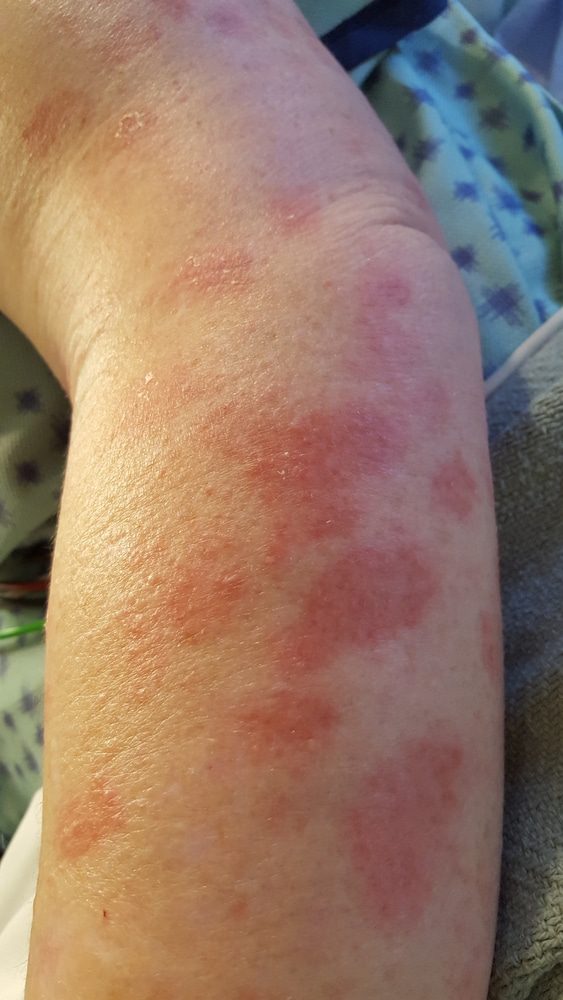Overview Of Erythema Multiforme
Erythema multiforme (EM) is an acute skin reaction that comes from an infection or another trigger. EM is a self-limiting disease. This means it usually resolves on its own without treatment.
Commonly Associated With
EM; Erythema multiforme minor; Erythema multiforme major; Erythema multiforme minor – erythema multiforme von Hebra; Acute bullous disorder – erythema multiforme; Herpes simplex – erythema multiforme
Causes Of Erythema Multiforme
EM is a type of allergic reaction. In most cases, it occurs in response to an infection. In rare cases, it is caused by certain medicines or body-wide (systemic) illness.
Infections that may lead to EM include:
- Viruses, such as herpes simplex that cause cold sores and genital herpes (most common)
- Bacteria, such as Mycoplasma pneumoniaethat cause lung infection
- Funguses, such as Histoplasma capsulatum, that cause histoplasmosis
Medicines that may cause EM include:
- NSAIDs
- Allopurinol (treats gout)
- Certain antibiotics, such as sulfonamides and aminopenicillins
- Anti-seizure medicines
Systemic illnesses that are associated with EM include:
- Inflammatory bowel disease, such as Crohn disease
- Systemic lupus erythematosus
- EM occurs mostly in adults 20 to 40 years old. People with EM may have family members who have had EM as well.
Symptoms Of Erythema Multiforme
Symptoms of EM include:
- Low-grade fever
- Headache
- Sore throat
- Cough
- Runny nose
- General ill feeling
- Itchy skin
- Joint aches
- Many skin lesions (sores or abnormal areas)
- Skin sores may:
- Start quickly
- Come back
- Spread
- Be raised or discolored
- Look like hives
- Have a central sore surrounded by pale red rings, also called a target, iris, or bulls-eye
- Have liquid-filled bumps or blisters of various sizes
- Be located on the upper body, legs, arms, palms, hands, or feet
- Include the face or lips
- Appear evenly on both sides of the body (symmetrical)
Other symptoms may include:
- Bloodshot eyes
- Dry eyes
- Eye burning, itching, and discharge
- Eye pain
- Mouth sores
- Vision problems
There are two forms of EM:
- EM minor usually involves the skin and sometimes mouth sores.
- EM major often starts with a fever and joint aches. Besides the skin sores and mouth sores, there may be sores in the eyes, genitals, lung airways, or gut.
Exams & Tests
Your health care provider will look at your skin to diagnose EM. You’ll be asked about your medical history, such as recent infections or medicines you’ve taken.
Tests may include:
- Skin lesion biopsy
- Examination of skin tissue under a microscope
Treatment Of Erythema Multiforme
EM usually goes away on its own with or without treatment.
Your provider will have you stop taking any medicines that may be causing the problem. But, don’t stop taking medicines on your own without talking to your provider first.
Treatment may include:
- Medicines, such as antihistamines, to control itching
- Moist compresses applied to the skin
- Pain medicines to reduce fever and discomfort
- Mouthwashes to ease the discomfort of mouth sores that interferes with eating and drinking
- Antibiotics for skin infections
- Corticosteroids to control inflammation
- Medicines for eye symptoms
- Good hygiene may help prevent secondary infections (infections that occur from treating the first infection).
- Use of sunscreen, protective clothing, and avoiding excessive exposure to the sun may prevent the recurrence of EM.



